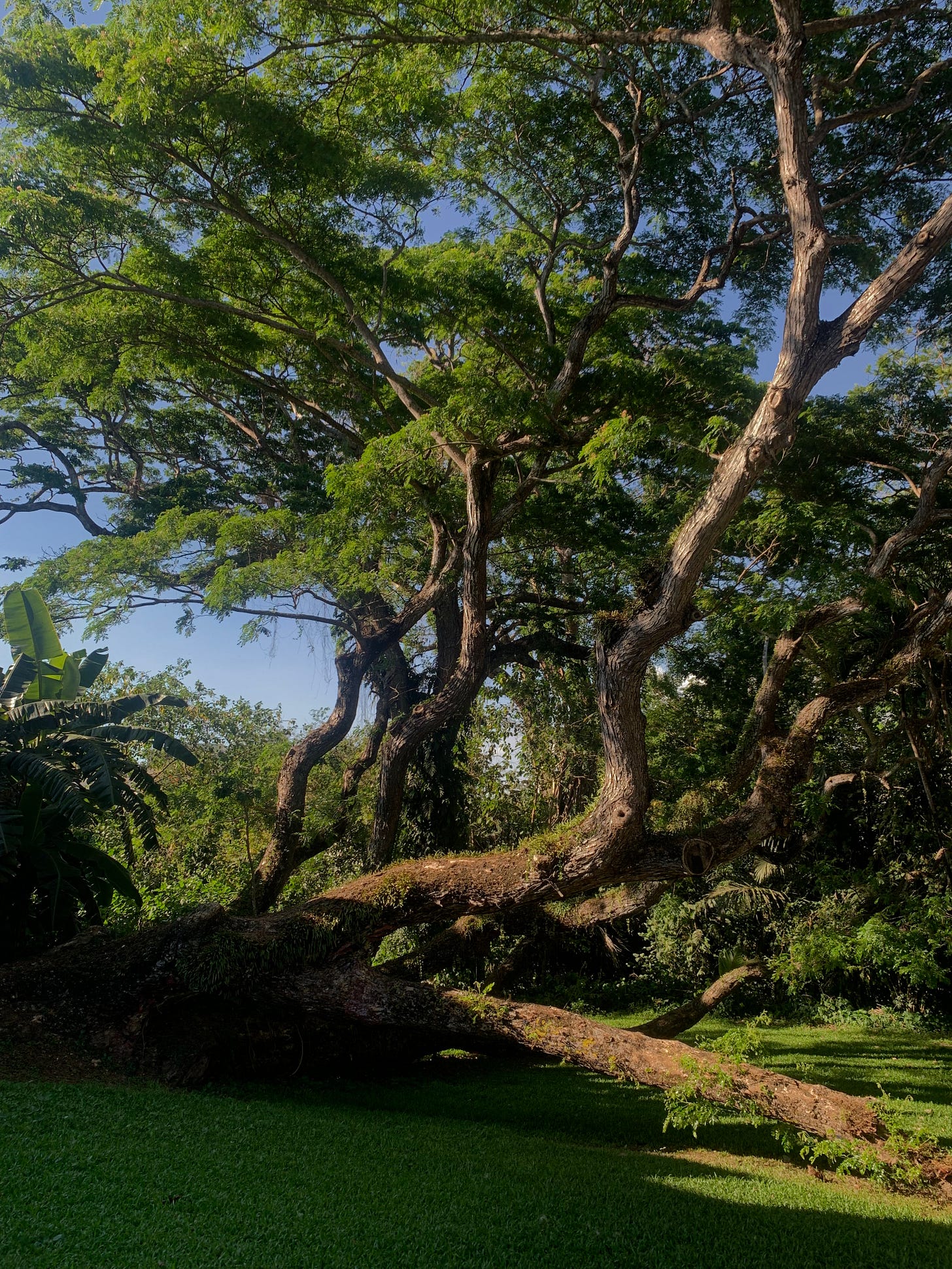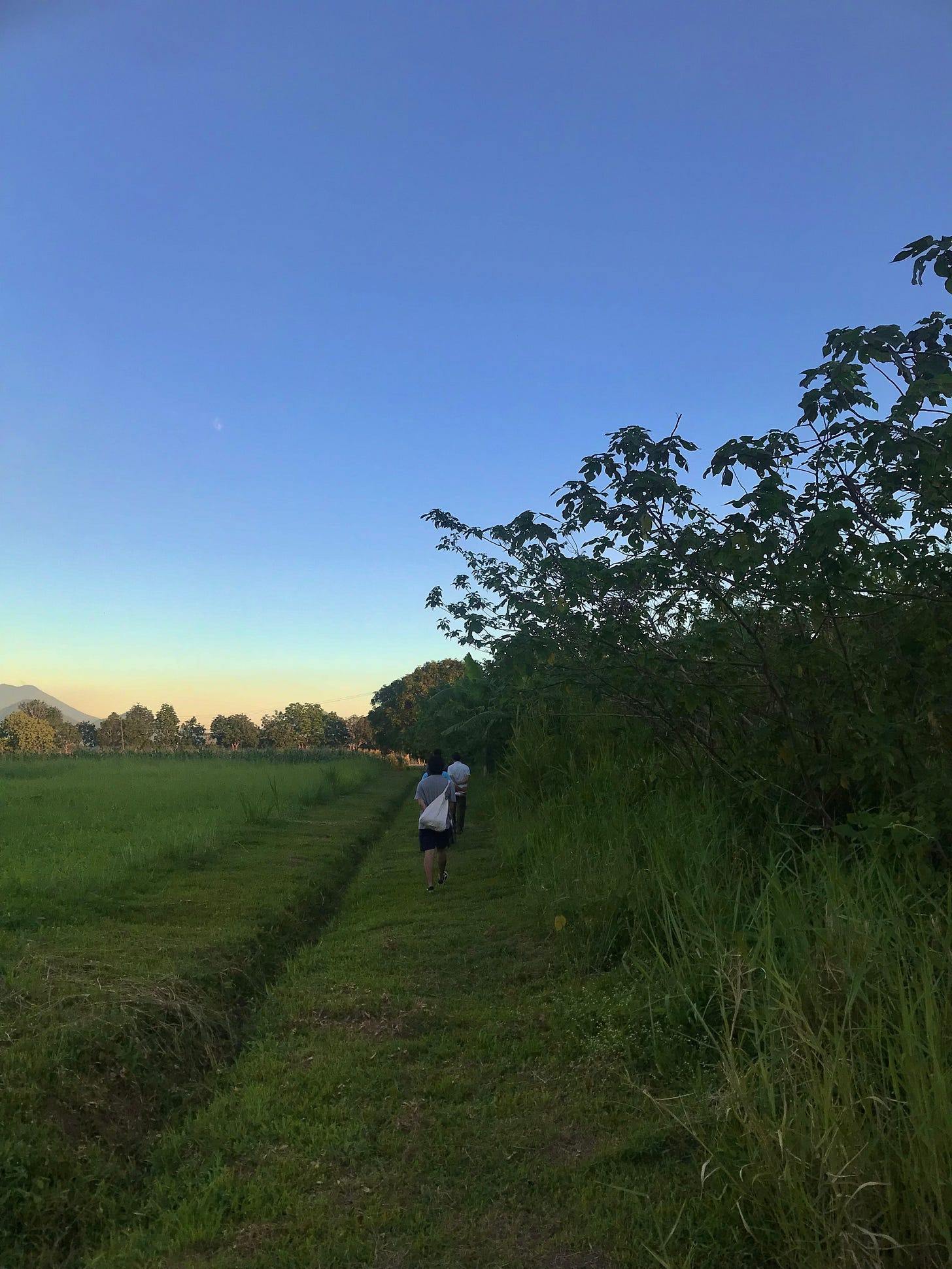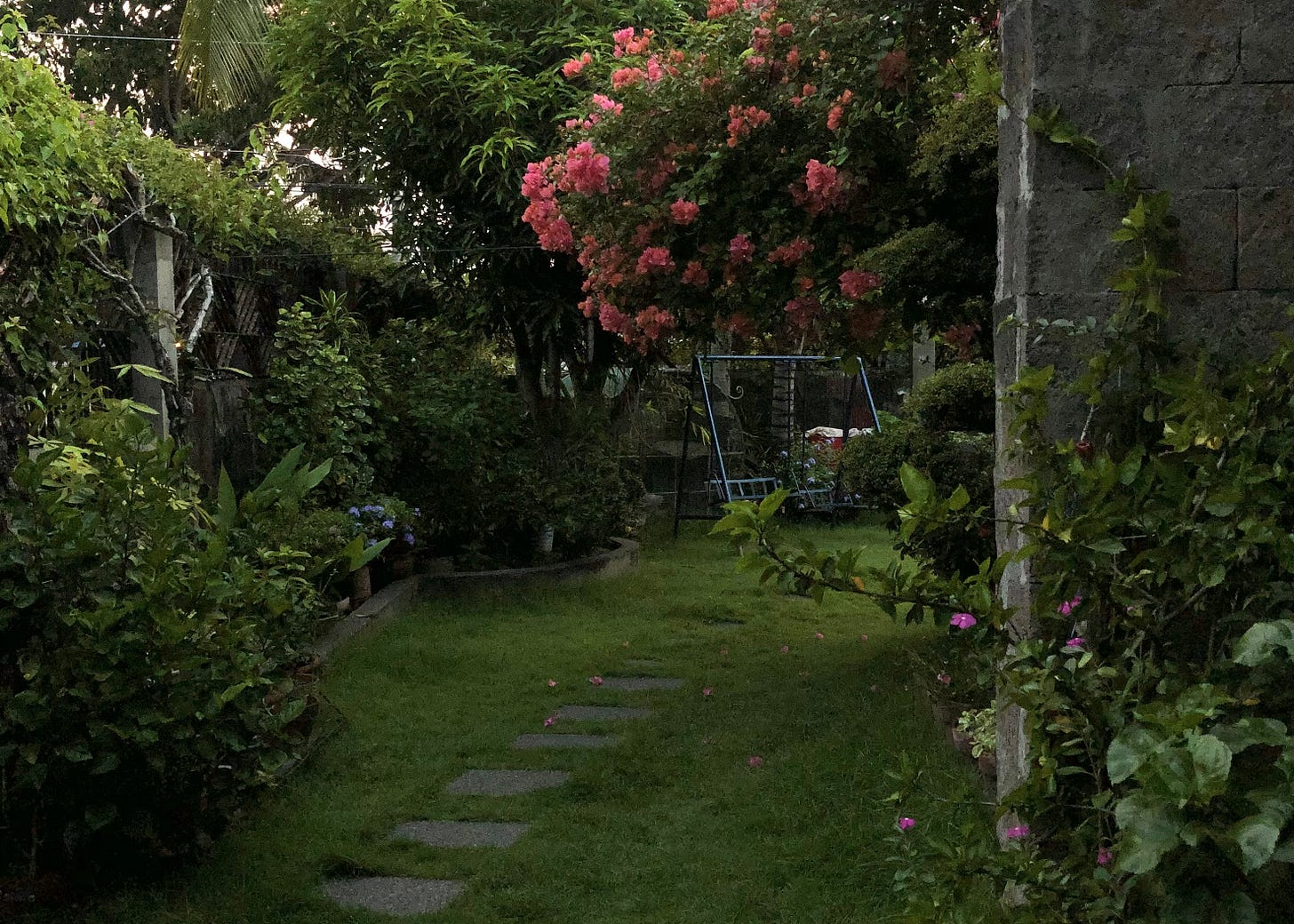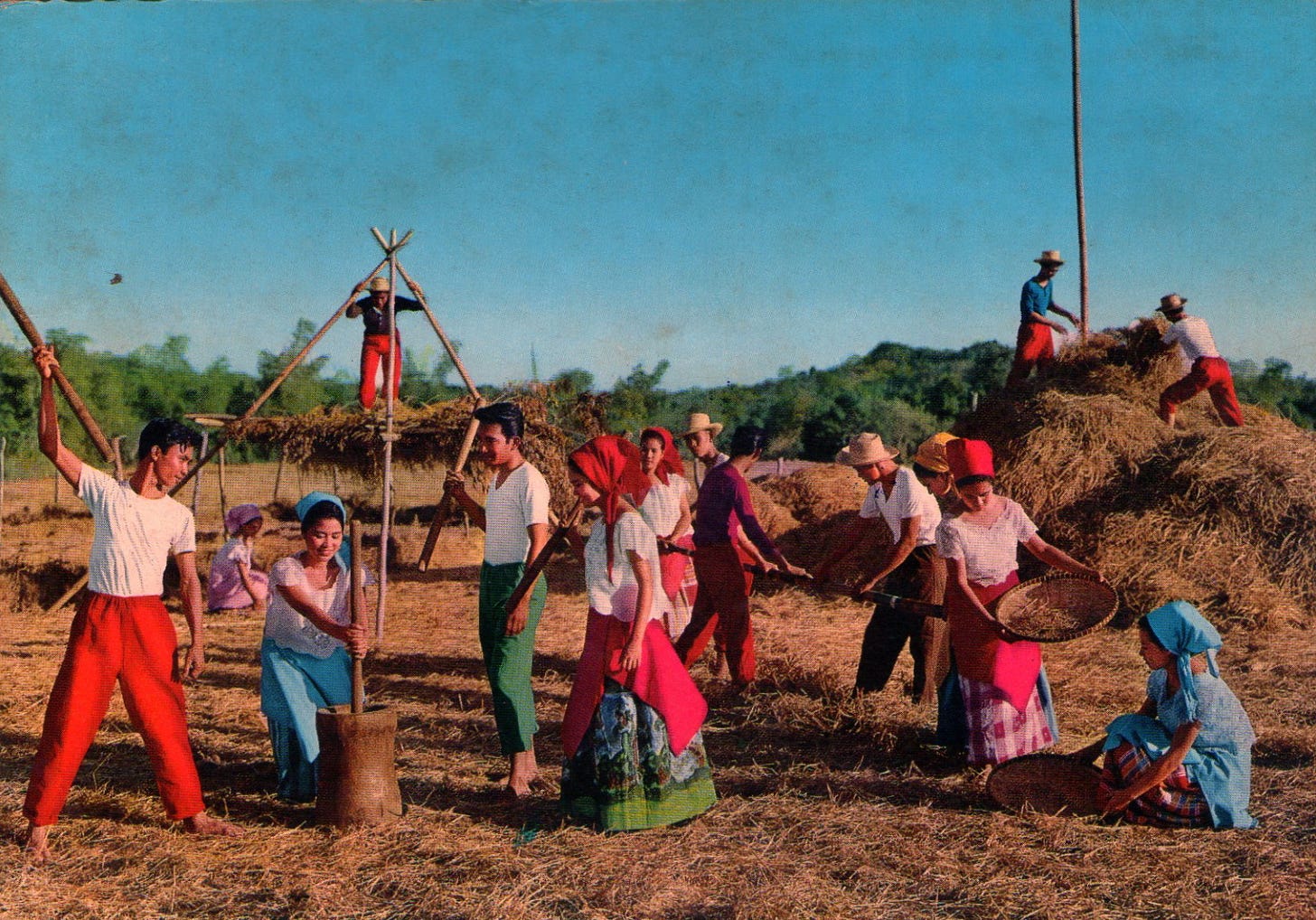Pause and Play
Recalibrating the movement of rest
Welcome to the first edition of Salu-salo, a sporadic newsletter where I write about food, feelings, and everything in between.
As a Filipina chef, a huge part of my identity is linked to the kitchen. This substack is an amalgamation of my love for food and writing, which evidently fuel each other. More about the thought process that went into this publication here.
Have a seat. I’m so glad to share this space with you.
I. Pause
A month-long hiatus from social media was ample time for me to reassess what rest truly meant to me. What does it look like? How should it feel in my body? When do I need it? Why am I tired? Am I allowed to indulge in full relaxation or do I just nibble on the odd bits and ends of downtime? Who dictates the requirements for rest?
I have a hard time staying still. Earlier this year I was in bedrest for weeks at a time due to chronic pain and that sent me into an existential spiral. Since I wasn’t able to cook, I felt detached from my personhood. In order to keep myself sane during periods of immobility, I reverted to activities that didn't require me to strain physically. My bond to food was limited to the media I was consuming: books, films, podcasts. My curiosity was constantly fed but there was no outward expression, I felt stuck creativity-wise.
The moment I started feeling better I instantly catapulted myself back into the culinary scene. I attended Good Food Community’s Flora Kulinarya workshop, I flew to Palawan to help host a dinner with Binhi Supperclub, I stayed in UPLB twice for Ili Likhaan’s exhibit ceremonies. I saw all my friends again after months of yearning to hug and feed them. I was everywhere, making up for everything I felt I missed out on… I’ve later identified this as a flawed mindset.
Hustle culture has blurred the line between productivity and self-worth. Rest is seen as a reward when it should be the opposite — instead of asking ourselves, “Have I worked hard enough to deserve rest?” the question should be, “Am I well-rested enough to perform?”. Like any machine without proper maintenance, our bodies and minds can only endure so much until respite is taken forcefully. That was exactly what happened when I failed to slow down.
The erratic current of highs and lows of everyday life feels like a nonstop blender whirring on whatever speed it wants to hurl me into, and I willingly submit. Sometimes I’m too wound up in turning something into a beautiful memory that I forget to pay attention as it plays out. While I was offline, I gave myself space to fully digest and reflect on the first half of this year.
In April I joined a meditational walk as part of the Ilihan workshop series. The program guided by Vince Imbat gave me an entirely different perspective on the concept of pausing. I’m very fond of walking, it’s a way for me to turn inward and make sense of my mind. Whenever I’m struggling with difficult thoughts, I walk directionless with no agenda until I come to a solution or tire myself enough to head back home. I have done so since I was a teenager. Walking is such an automatic task (which is why I love it) that I rarely give any thought or care into the process. My brain is noisy, I just go. If I get tired, I’ll sit wherever I find myself.
Our trek across UPLB grounds was organized into parts so that we could focus on three key aspects: kapwa (neighbor), pook (place), and sarili (self). The brief was simple, Vince said that prompts would be given along the way and that excited me. In the second part of our walk, we arrived at a field and it was revealed that this time would be used to rest “however that feels like to you.” We sat on the grass, some laid down and took naps, and others took photos. I idled in awkwardness thinking but I’m not tired yet!
This is how I came to the realization that I never anticipate or plan for rest in any aspect of my life. As a chef, I was conditioned to operate on the perfectionist premise of leaving no task unfinished. In the kitchen we do as much prep as we can to be able to clock out earlier. The signifier for me to take a break was that I felt tired, and even while on break I couldn’t allow myself to relax because I was preoccupied with the same task I had just stepped away from.
The way that Vince structured our program helped me unlock a new application for rest; how the mere addition of a purposeful break can add depth to any experience. It seems like a shallow observation but often times we’re too caught up in our routines and rely solely on instinct to tell us when to pause. I now understand that tiredness is an indication that I’ve already surpassed my capacity, which is never a good state to foster anything meaningful.
II. Play
This past month away from the algorithms has helped me redefine my boundaries regarding work, relationships, and the passions I continue to pursue. I devoted most of my time to learning. What I’m most proud of in 2023 is the concrete decision to further my academic studies. Becoming a university student again in my thirties is an equally exciting and terrifying feat.
The nagging question I’m constantly asked is “What are you going to do with an art degree?”. Truth is I’m more invested in the process versus the diploma. As part of my inquisitive nature, it has always been my goal to explore how food intersects with Arts. Humanities. Politics. Legislation. Economics. Design. Food is an integral yet often disadvantaged mechanism of how the world operates and I have responsibility as a service professional to understand how these lines meet.
I’m now far from, and better than, the chef I envisioned myself to be 10 years ago but this redirection came gradually through an (ongoing) uncomfortable series of decolonization. Reconstructing my role in the kitchen requires a lot of learning and unlearning, habit removal, reconditioning and rediscovering new mediums for the culinary agenda. UP is but another stepping stone in this arduous journey and I believe that I’m on the right path.
Sharing an excerpt from an essay I wrote last term about the similarities of movement in cooking and dance:
The process of cooking can be likened to dancing in a stylistic sense. Rhythm is of utmost importance in movements found in both practices: there is a sense of narration — once connected as a string of repetitive or stand-alone gestures, each motion comes to conclusions of their own creations. Albeit theater and culinary are two entirely different mediums of art, their similarities echo each other’s purpose in community.
In their own ways, both are primitive practices that translate and communicate art without using words. I’m not a professional dancer but I can tell you that kitchens operate at the same level of intricacy and dedication that can be seen as contemporary choreography. As cooks, we practice and hone our individual skills until we come together to perform on stage (the kitchen), where we move to an invisible tune.
Postcard courtesy of National Bookstore, circa 1960s
The parallels of learning begin here.
As I venture into my newfound love for academia, my teenager Z is taking a gap year from formal schooling. This is an option we’ve been closely considering since the feeling of burnout started creeping in a year ago. When Z told me that school was no longer enjoyable, I felt deeply ashamed of the state of our educational system. It’s grim for a child to feel that they are on the receiving end of poor service at such a young age. We looked at different schools, sought individual counselling, and went on a month-long summer trip to help each other look at the bigger picture.
I’m a firm believer in giving children agency to make their own decisions, this sets them up for independence while learning the repercussions that come with it. Thirteen is young but old enough to know when something isn’t right.
A common misconception about rest is that it equates to doing nothing. The act of resting is anything that restores depleted energy. Aside from moments of physical relaxation, we have the ability to engage in things that recharge us mentally and emotionally. A gap year can be equally, if not more, fulfilling as a year spent in a traditional classroom. Z has joined an interest-led learning program as we figure out the slippery slopes of un-schooling together. This means that as a parent, I become the homeroom teacher by default.
While the goal is for Z to have a restful year, there will be structure and movement. Learning shouldn’t be limited to a chalkboard. We have been implementing our own activities following the self-directed model at home. If you grew up in the Philippines, you’re familiar with the concept of monthly school activities centered on a specific theme. We’ll continue to use relevant topics as educational prompts and hopefully share our progress as we go.
August is Buwan ng Wika. I think I’m horrible at teaching but as a mom, I know exactly how to pique a child’s interest. I’ve always thought that the best way to learn a language is by linking words to cultural references, so we’ve been learning Tagalog through history and food.
Below is a recipe card I made for Z, also yours to use/save/print as you please!
Making this recipe together also came with a lengthy discussion about the Spanish occupation, which is indisputably tied to Philippine cuisine. My knowledge in such is made possible by Doreen Fernandez (+) and the many food writers and historians who have paved the way for curious cooks like me.
Adobo identity crisis aside, we mulled over each other’s chosen focuses for the year and poked fun at the contrast. It has been a fruitful month and Tuesdays (cooking with Z) will continue to be my favorite day for the foreseeable future.
Rest can look different to everyone; for me it’s solving crossword puzzles, sharing a meal with a good friend, gardening, curling up with a new book, laughing with my kids. Rest is savoring enough silence to be able to dive back into the noise.
I’m slowly noticing the difference between anxious and inspired energy. The internal drive to work towards anything entails an intentional pause to reflect, recenter, and reinvent how our routines can become sustainable practices. In a capitalist world, prioritizing rest is not only an act of resistance but also community care. How we care for ourselves and each other extends to the love we put into labor.
The right time for anything is when you feel most inspired to do it. ✦
Postscript ~ here’s a roundup of favorite food media I’ve consumed this month!
Novelty read:
A Curious History of Food and Drink - Ian Crofton
A chronological account of F&B dating back to Homo Erectus era. This was a light read that I could pop open at any page and find something to geek/gross out on. I love that all sources were stated so I lead myself down more rabbit holes. Nothing makes me happier than obsessing about a random food fact.
New (old) film I discovered:
Eat Drink Man Woman (Taiwanese) directed by Ang Lee
A widowed father and his daughters navigate their personal relationships under a tense family dynamic. Difficult conversations are presented almost every Sunday when they all gather for an elaborate dinner. I particularly enjoyed the food shots more than the plot but also admired the complexity of each character’s individual plight. The subtle themes of loss and yearning thrown in with the mundane reminded me of how ordinary our problems are. Conflict is ingrained in the human experience, that’s life!
Hope you relish every feeling that life has to offer. I love you, I want us to eat well!
Patricia ♡
If you appreciate Salu-salo, feel free to share this publication or pledge your support









